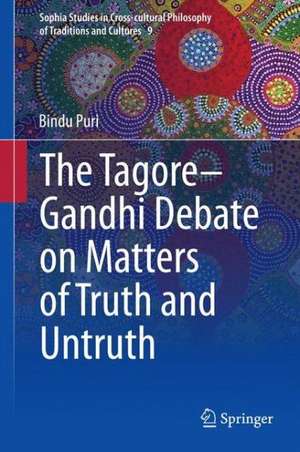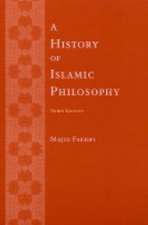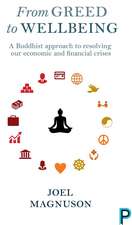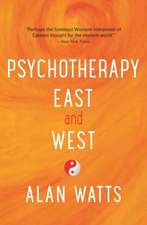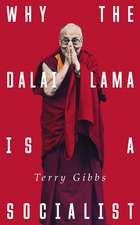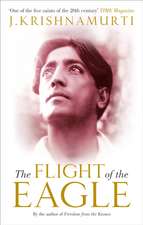The Tagore-Gandhi Debate on Matters of Truth and Untruth: Sophia Studies in Cross-cultural Philosophy of Traditions and Cultures, cartea 9
Autor Bindu Purien Limba Engleză Hardback – 8 dec 2014
The only single-authored volume on the Tagore-Gandhi debate, this book is a welcome addition to the existing literature.
| Toate formatele și edițiile | Preț | Express |
|---|---|---|
| Paperback (1) | 361.03 lei 38-44 zile | |
| Springer India – 10 sep 2016 | 361.03 lei 38-44 zile | |
| Hardback (1) | 375.53 lei 17-23 zile | +35.33 lei 6-12 zile |
| Springer India – 8 dec 2014 | 375.53 lei 17-23 zile | +35.33 lei 6-12 zile |
Din seria Sophia Studies in Cross-cultural Philosophy of Traditions and Cultures
-
 Preț: 395.25 lei
Preț: 395.25 lei - 18%
 Preț: 726.69 lei
Preț: 726.69 lei - 15%
 Preț: 701.72 lei
Preț: 701.72 lei - 15%
 Preț: 651.67 lei
Preț: 651.67 lei - 18%
 Preț: 736.32 lei
Preț: 736.32 lei - 18%
 Preț: 782.10 lei
Preț: 782.10 lei - 24%
 Preț: 1038.21 lei
Preț: 1038.21 lei -
 Preț: 375.45 lei
Preț: 375.45 lei - 20%
 Preț: 570.73 lei
Preț: 570.73 lei -
 Preț: 376.15 lei
Preț: 376.15 lei -
 Preț: 378.64 lei
Preț: 378.64 lei -
 Preț: 377.55 lei
Preț: 377.55 lei - 20%
 Preț: 559.21 lei
Preț: 559.21 lei - 20%
 Preț: 568.44 lei
Preț: 568.44 lei - 20%
 Preț: 511.16 lei
Preț: 511.16 lei - 20%
 Preț: 559.21 lei
Preț: 559.21 lei - 20%
 Preț: 567.63 lei
Preț: 567.63 lei - 24%
 Preț: 590.54 lei
Preț: 590.54 lei - 24%
 Preț: 794.98 lei
Preț: 794.98 lei - 24%
 Preț: 585.65 lei
Preț: 585.65 lei - 20%
 Preț: 521.58 lei
Preț: 521.58 lei -
 Preț: 378.64 lei
Preț: 378.64 lei -
 Preț: 479.29 lei
Preț: 479.29 lei - 20%
 Preț: 554.67 lei
Preț: 554.67 lei - 20%
 Preț: 569.86 lei
Preț: 569.86 lei - 15%
 Preț: 578.67 lei
Preț: 578.67 lei - 20%
 Preț: 556.90 lei
Preț: 556.90 lei - 18%
 Preț: 949.10 lei
Preț: 949.10 lei
Preț: 375.53 lei
Nou
Puncte Express: 563
Preț estimativ în valută:
71.87€ • 74.75$ • 59.33£
71.87€ • 74.75$ • 59.33£
Carte disponibilă
Livrare economică 19-25 martie
Livrare express 08-14 martie pentru 45.32 lei
Preluare comenzi: 021 569.72.76
Specificații
ISBN-13: 9788132221159
ISBN-10: 813222115X
Pagini: 193
Ilustrații: XXXV, 181 p. 1 illus.
Dimensiuni: 155 x 235 x 20 mm
Greutate: 0.5 kg
Ediția:2015
Editura: Springer India
Colecția Springer
Seria Sophia Studies in Cross-cultural Philosophy of Traditions and Cultures
Locul publicării:New Delhi, India
ISBN-10: 813222115X
Pagini: 193
Ilustrații: XXXV, 181 p. 1 illus.
Dimensiuni: 155 x 235 x 20 mm
Greutate: 0.5 kg
Ediția:2015
Editura: Springer India
Colecția Springer
Seria Sophia Studies in Cross-cultural Philosophy of Traditions and Cultures
Locul publicării:New Delhi, India
Public țintă
GraduateCuprins
Chapter 1: The Tagore-- Gandhi Debate: An Account of the Central Issues.- Chapter 2: Of Mantras and Unquestioned Creeds: Re-constructing Gandhi’s Moral Insights.- Chapter 3: Gandhi's Truth: Debate, Criticism, and the Possibilities of Closure in Moral Arguments.- Chapter 4: Tagore: On the possibilities of untruth and moral tyranny.- Chapter 5: Understanding Swaraj: Tagore and Gandhi.- Chapter 6: Gandhi and Tagore: Life in an Enchanted Cosmos.
Recenzii
“This is an important book–as the first monograph on the debate between Rabindranath Tagore and Mahatma Gandhi … . it also provides a sharp picture of the two positions in the debate, drawing attention to many truths about them which are not obvious and deserve to be emphasised. … The treatment is repeatedly powerful and the book is highly successful in advancing understanding of the philosophical confrontation between these two great leaders.” (Richard Sorabji, SOPHIA, Vol. 55, 2016)
Notă biografică
Bindu Puri is an associate professor with the Department of Philosophy, University of Delhi, Delhi, India. She has been interested in issues in political philosophy, moral philosophy, and modern Indian philosophy. She has published six books, including one monograph, entitled Gandhi and the Moral Life. She has edited Mahatma Gandhi and His Contemporaries and co-edited two volumes on the philosophy of Immanuel Kant, entitled Reason, Morality and Beauty, and Terror, Peace and Universalism, published by Oxford University Press. She has recently co-edited a special issue of IIC Quarterly on Living with Religious Diversity (April 2014). She has published about 35 articles, including book reviews, in philosophical and interdisciplinary journals of international repute, including articles in Sophia, Philosophia and the Journal of Indian Council of Philosophical Research, some of which are: The Self and the Other: Liberalism and Gandhi (Philosophia, Vol. 39[4], 2011); Freedom and the Dynamics of the Self and the “Other”: Re-constructing the Debate between Tagore and Gandhi (Sophia 52[2], 2013); and Finding Reasons for Being Reasonable: Interrogating Rawls (Sophia 2014). Professor Puri has presented many papers in national and international seminars and has delivered several invited lectures in universities in India and abroad.
Textul de pe ultima copertă
This volume discusses the development of the dialogue between Tagore (1861-1941) and Gandhi (1869-1948) during 1915 and 1941, about many things of personal, national, and international significance---satyagraha, non-cooperation, the boycott and burning of foreign cloth, the efficacy of fasting as a means of resistance and Gandhi’s mantra connecting “swaraj” and “charkha”. The author, Bindu Puri, argues that the debate was about more fundamental issues, such as the nature of truth and swaraj/freedom and the possibilities of untruth that Tagore saw in Gandhi’s movements for truth and freedom. Puri shows that the differences between the two men’s perspectives came from differently negotiated relationships to (and understandings of) tradition and modernity. Tagore was part of the Bengal renaissance and powerfully influenced by the idea that the Enlightenment consisted in the freedom of the individual to reason for herself. Gandhi, on the other hand, remainedclose to the Indian philosophical tradition which linked individual freedom to moral progress. Puri points out that Tagore cannot, however, be unreflectively assimilated to the Enlightenment project of Western modernity, for he came fairly close to Gandhi in rejecting the anthropocentricism of modernity and shared Gandhi’s belief in an enchanted cosmos.
The only single-authored volume on the Tagore-Gandhi debate, this book is a welcome addition to the existing literature.
The only single-authored volume on the Tagore-Gandhi debate, this book is a welcome addition to the existing literature.
Caracteristici
The only monograph on the Tagore-Gandhi debate Provides a philosophical re-interpretation of Tagore’s positions on nationalism and cosmopolitanism Gives new insights on Gandhi's central moral and political concepts Examines Akeel Bilgrami’s reading of Gandhi’s truth Discusses the differences between Tagore and Gandhi’s understandings of swaraj/freedom Includes supplementary material: sn.pub/extras
